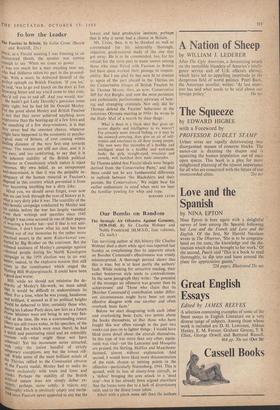Fo low the Leader
The Fascists in Britain. By Colin Cross. (Barrie and Rockliff, 21s.)
ONicti, at a Fascist meeting I was listening to on liampstead Heath, the speaker was unwise enough to say 'When we come to power. . . It was too much for a man standing near me, Who had thitherto taken, no part in the proceed- ings. With a snort, he delivered himself of the Perfect epitaph on British Fascism. 'If you lot,' he said, 'was to go and knock on the door at Ten Downing Street and say you'd come to take over, they'd tell you to sod off. And you would, too.'
He hadn't got Lady Dorothy's patrician tones quite right; but he had hit Sir Oswald Mosley.
17, or the point about Mosley and British Fascism' is not that they never achieved anything more impressive than the beating-up of a few Jews and the smashing of a few shop-windows; it is that they never had the remotest chance, whatever might have happened to the economic or psycho- i ,qical state of Britain, of ever coming within hailing distance of the very first step towards Power. The reasons are still not clear, and it is 1°0 easy, and too comforting, to say that it is the inherent stability of the British political character or Constitution which makes it reject extremes. My own belief, as an unrepentant anti-determinist, is that it was the palpable in-, disposal of the human material at Fascism's uisposal in this country which prevented it from eer becoming anything but a dirty joke.
Mind you, we should never forget, even now that we can look through the eyes of history at it,
what a very dirty joke it was. The scurrility of the ailti*Semitic campaign conducted by Mosley and his rabble before the war has largely vanished ci IirPol their writings and speeches since 1945 ‘tnough I was once accused in one of their papers °f wearing a bowler hat —and if that is not anti- „ethitism, I don't know what is), and has been blotted out of our memories by the rather more Practical essays in the same Kulturkampf con- ducted by Big Brother on the continent. But the debased nastiness of Mosley's campaign against coloured people during his North Kensington
better; in the 1959 election was in no way Defter; indeed, in the explosive tension that still
exists in the constituency which staged the Notting Hill Walpurgisnacht, it could have been good deal worse.
Still, while we should not minimise the de- pravity of Mosley's life-work, we must admit that it would be difficult to underestimate its effect. For a time, when he was young, handsome and brilliant, it seemed as if no political heights Would be debarred to him; certainly those who, (11-1ring his Labour Party
p days, saw him as a future !Imo Minister were not being in any way fan- aul at the time. He was a commanding orator
(there are still traces today, in his speeches, of the power and fire which were once there), he had a quick and penetrating mind and an ostensibly resolute will—what might these not have achieved! Yet his movement never attracted, With only the tiniest handful of strictly temporary exceptions, any but the lowest riff- r411. While some of the most brilliant minds of the Thirties rallied to the Communist obverse al the Fascist medal, Mosley had to make do r, almost exclusively with touts and louts and
`ranks. Perhaps the stability of the British iPOlitical nature does not simply debar ex-
lielies; perhaps, more subtly, it rejects any VPosophy which is obviously empty and sterile
ci since Fascism never appealed to any but the lowest and least productive instincts, perhaps that is why it never had a chance in Britain.
Mr. Cross, then, is to be thanked as well as commended for his admirably thorough, objective, good-natured study of the one that got away. He is to be commended, too, for his refusal for the most part to name names among, those who once flirted with Fascism in Britain but have since worked their passage to respect- ability. But I am glad he has seen fit to remind us again of the part played in the Thirties on the Conservative fringes of British Fascism by Sir Thomas Moore, then, as now, Conservative MP for Ayr Burghs, and now the most persistent and enthusiastic parliamentary, advocate of beat- ing and strangling criminals. Not only did Sir Thomas defend the Fascists' behaviour at the notorious Olympia meeting in 1934: he wrote in the Daily Mail of a march by their thugs: What is there in a black shirt that gives ap- parent dignity and intelligence to its wearer? For certainly some inward feeling, or it may be the outward covering, does give an air of 'self- respect and assurance to all these young people. The men were fine examples of a healthy and intelligent mind in a healthy and well-made body; the girls, straight-eyed, vivacious and comely, well matched their male comrades.
Sir Thomas added that Fascist ideals were 'largely derived from the Conservative Party,' and that there could not be any fundamental difference in outlook between 'the Blackshirts and their parents, the Conservatives.' We might bear his earlier enthusiasm in mind when next we hear the familiar yowling for whip and rope.
BERNARD LEVIN






































 Previous page
Previous page